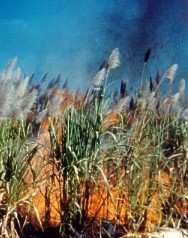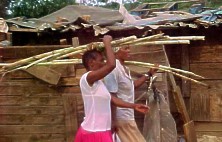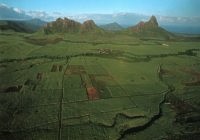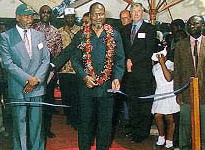
|
|
A UK development agency
says European Union (EU) consumers and taxpayers
are paying to destroy livelihoods in the world's
poorest countries. The agency, Oxfam, says the
EU's sugar policy makes profits for Europeans
while keeping developing countries poor. The
report is released days before the start in South
Africa of the World Summit on Sustainable
Development (WSSD), where world leaders will
attempt to agree a plan to reduce world poverty.

Die britische
Entwicklungshilfeorganisation OXFAM hat in einem
Bericht zum Erdgipfel in Johannesburg
klargestellt, dass durch die EU-Zucker-Politik
Steuerzahler und Konsumenten in der Europäischen
Union dafür bezahlen, Menschen in den ärmsten
Ländern arm zu halten. |
| |
|
|
 |
|
Sugar
cane has been grown and milled in the Southern
African region for centuries. Excellent growing
conditions, high yielding cane varieties and
relatively low milling costs combine to position
the Southern African Development Community as one
of the world’s largest sugar producing
regions with an average annual production of 3,8
million tons. There are nine main sugar producing
countries:
Malawi / Mauritius / Réunion / Mozambique /
Swaziland / South Africa / Tanzania / Zambia /
Zimbabwe |
| |
|
|
Beispiel
Mauritius & Réunion: |
|
 |
|
Ursprünglich waren
die Tieflandsregionen von Mauritius durch
immergrüne, tropische
Tieflandsregenwälder geprägt , die
durch die Besiedlung der Insel von den
Holländern langsam der 1639
eingeführten Nutzpflanze Zuckerrohr
weichen mussten. |
|
| |
|
|
Example
Mozambique: |
|
 |
|
October, 1999:
President Chissano of Mozambique,
officially re-opens the Maragra mill's
doors for business after a fifteen-year
closure.
March 2002:
bringing back on line the Maragra sugar
estate less than one year after serious
flooding |
|
| |
|
|
 |
|
The European
Commission has finalised the regulation
that opens a tariff quota for raw cane
sugar originating from least developed
countries for refining in the EU during
the marketing year 2001/02. It sets a
quota of 74,185 tonnes with a minimum
purchase price of Euro 49.68 per 100kg. |
Oxfam
says Europe's subsidised over-production of sugar
is having a "devastating impact" on the
poor world, ensuring big profits for the EU's
large farmers and sugar processors, but
"undermining opportunities for people in the
developing world to work their way out of
poverty". "The sugar regime is a clear
example of Europe's blatant hypocrisy in dealing
with developing countries." "They
pressurise poor countries to open their markets
while protecting their own through tariffs and
subsidies." "International trade has
the potential to help lift millions of people out
of poverty, but it will never do this as long as
we continue with the current rigged rules and
double standards like those maintained through
the CAP." Oxfam says that quotas and tariffs
set Europe's sugar prices at almost three times
the world market price, meaning huge subsidised
surpluses are dumped annually overseas,
depressing world prices and pushing other
exporters out.
|
|
 Sugar
production in the EU is a major industry,
accounting for some 23 million metric tons in the
year 2000, of which 14m metric tons was consumed
within the Community, 6m were exported and 3m was
stored (for which aid was paid). Imports were
approximately 1.8 million metric tons. Sugar
production in the EU is a major industry,
accounting for some 23 million metric tons in the
year 2000, of which 14m metric tons was consumed
within the Community, 6m were exported and 3m was
stored (for which aid was paid). Imports were
approximately 1.8 million metric tons.
Imports from third countries are heavily
restricted although, under a protocol to the Lome
Convention, the EU pays above world prices to
import 1,3045 million metric tons of raw sugar
annually from 17 African, Pacific and Caribbean
(ACP) countries, most of which (about 1m tonnes)
is refined by the UK.

Die Produzenten sind vom
europäischen Abnehmer abhängig, denn die
EU-Kommission entscheidet über den Ankauf der
tropischen Ware. Anhand der Quotenregelung wird
der Basispreis jedes Jahr neu festgesetzt. Dieser
liegt weit über dem Weltmarktpreis, deckt aber
keineswegs die Kosten der Pflanzer.

|
|